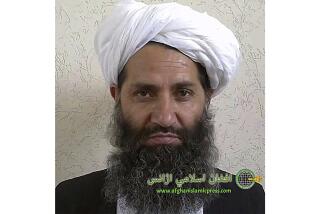Crackdown Not a Bow to the West, Musharraf Tells Clerics
- Share via
ISLAMABAD, Pakistan — Six days after announcing a major crackdown against militant Islamic extremist groups in the country, Pakistani President Pervez Musharraf tried to reassure a gathering of Muslim religious leaders Friday that the move wasn’t an attempt to Westernize Pakistani society.
“We want progress but not Westernization,” he told the meeting of clerics. Musharraf said his vision for Pakistan is neither what he termed an “ultramodern” state nor one ruled by religious extremists. Instead, he said, he wants to create a society that follows a middle ground.
“We can be both progressive and religious at the same time,” said Musharraf, who came to power in a 1999 coup.
Musharraf’s comments at the meeting, which was arranged by the country’s Ministry of Religious Affairs, was clearly an attempt to reach out to powerful clerics after his government’s move against militants.
Police sweeps have so far led to the detention of about 2,000 suspected militants and the closure of the offices of five extremist groups. Together with Musharraf’s embrace of the West in the wake of the Sept. 11 terrorist attacks in the United States, the move has deeply unsettled some conservatives here.
On Friday, Musharraf had harsh words for militant Islamists, describing them as people who “did not want to learn anything other than religion and wanted to impose their views on others.”
“We need to end this culture of violence, hatred, terrorism, extremism and sectarianism,” he told the conference.
Some religious leaders voiced support for Musharraf’s comments.
“It’s what I stand for and the bulk of Pakistanis stand for,” said Khurshid Ahmad, vice president of Jamaat-i-Islami, Pakistan’s largest religion-based political party. “What he said is perfectly all right.”
Jamaat-i-Islami supported the former Taliban government in Afghanistan and played a relatively minor role in the anti-American, anti-government street demonstrations last fall in Pakistan’s major cities. It rejects violence as a political tactic.
Musharraf cited educational reform as a key to social reform and any movement toward the envisioned middle ground between Westernization and Islamic militancy. Pakistan’s current educational structure includes a small number of expensive English-language private schools that cater to an urban elite; a far larger system of Urdu-language public schools attended mainly by middle-class students; and a growing number of religious schools, or madrasas, that offer a free but extremely narrow education, mainly to boys from poor families.
In recent years, a growing number of madrasas have begun preaching an aggressive kind of anti-Westernism. The tone of this message helped fuel the initial convulsion of anti-American sentiment that swept the country in the first days after Sept. 11. Musharraf said the religious school curriculum should be revamped.
“We want the students who are educated in the madrasas to be useful and productive members of society,” he said.
Musharraf also told the religious leaders to stay out of Pakistan’s standoff with India over Kashmir--a face-off that has led to a major military buildup on both sides of the 1972 cease-fire line that divides the disputed Himalayan region.
“You people should trust the government on it,” he told them.
More to Read
Sign up for Essential California
The most important California stories and recommendations in your inbox every morning.
You may occasionally receive promotional content from the Los Angeles Times.













